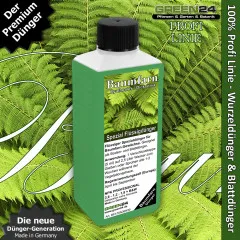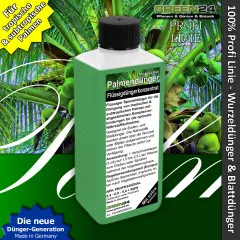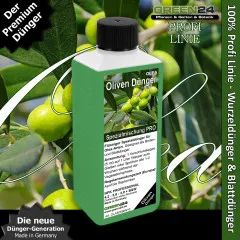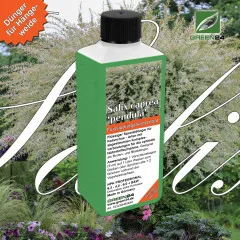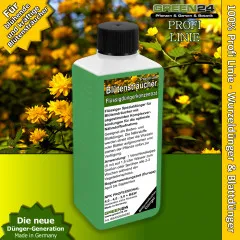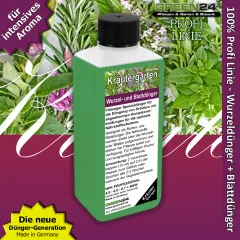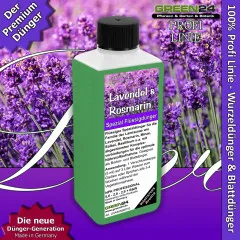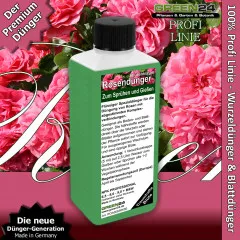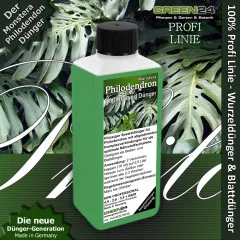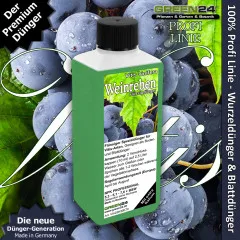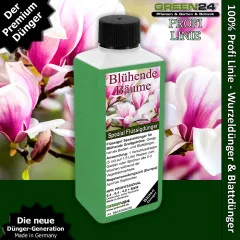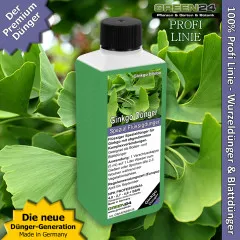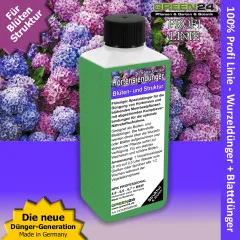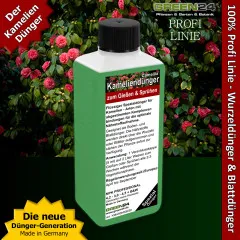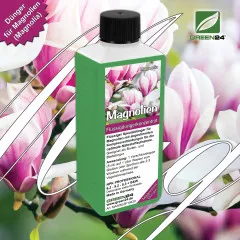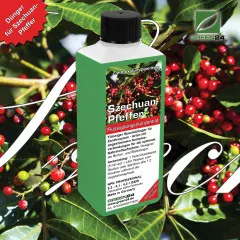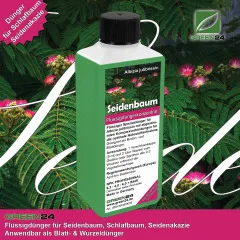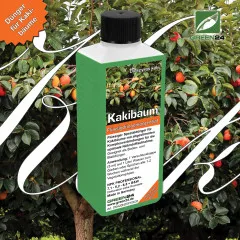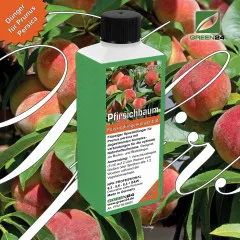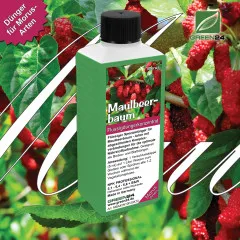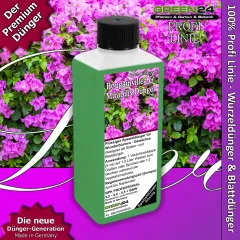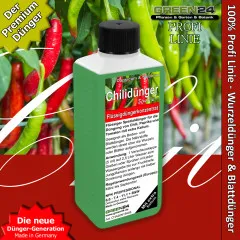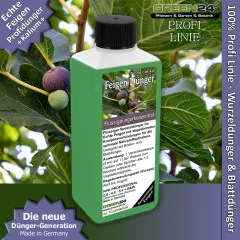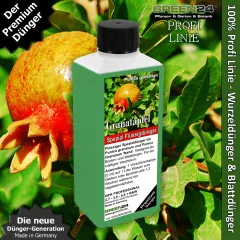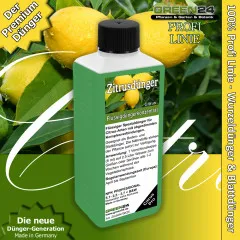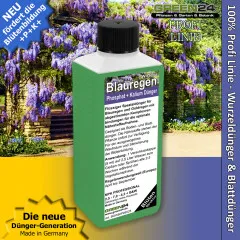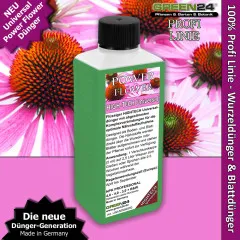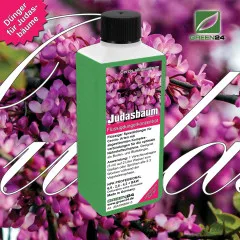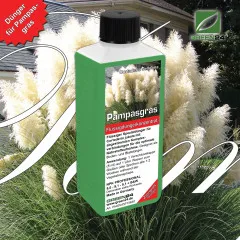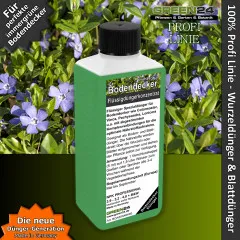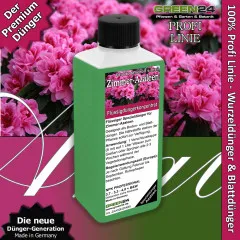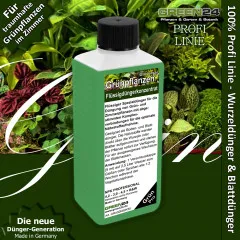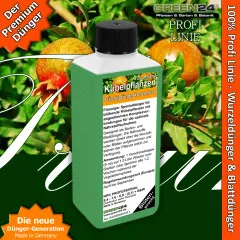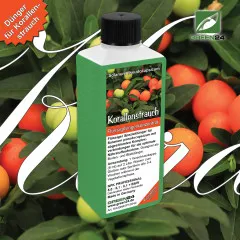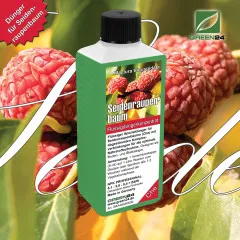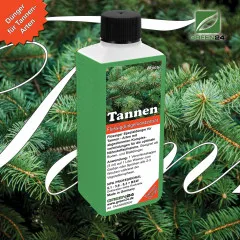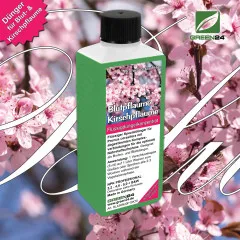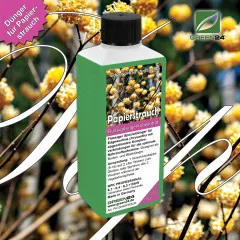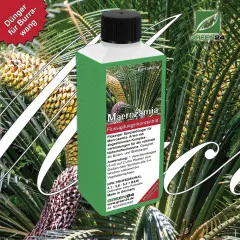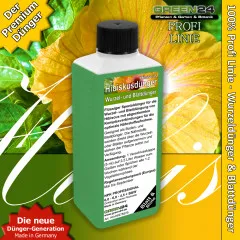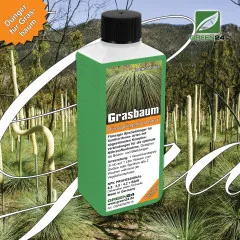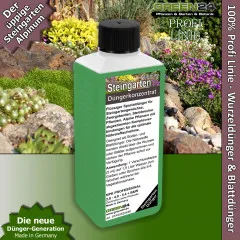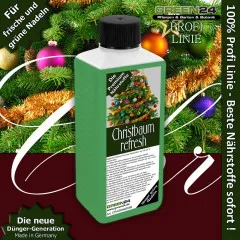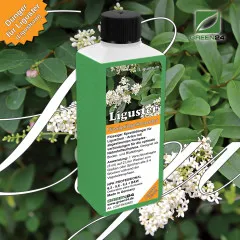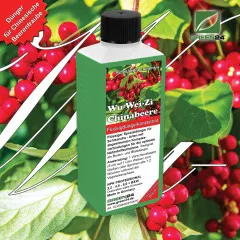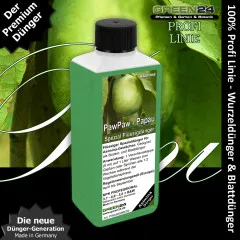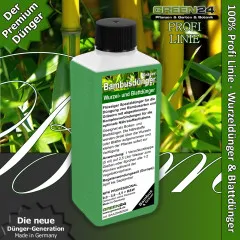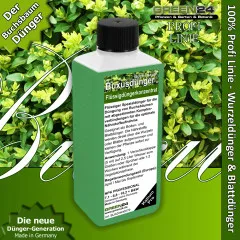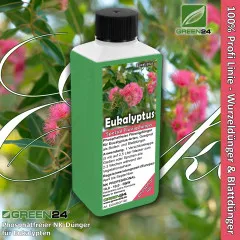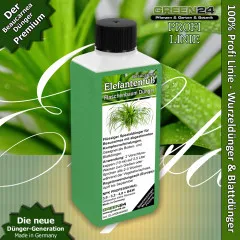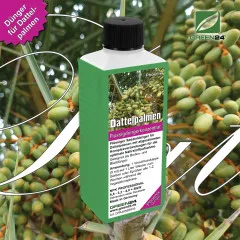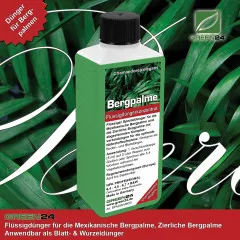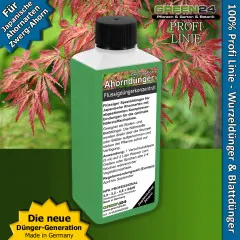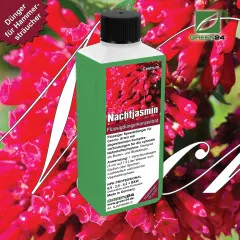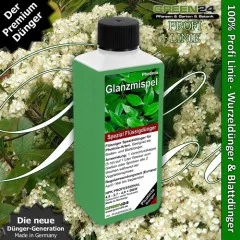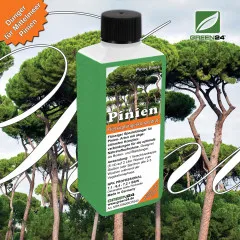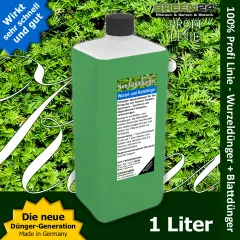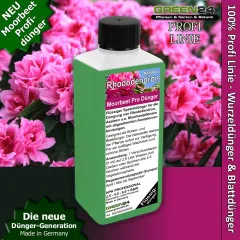Moorland Specialist: GREEN24 Rhododendron & Azalea Fertilizer
Rhododendrons and azaleas belong to the heath family (Ericaceae) and are true specialists for acidic soils with very special nutrient requirements. These demanding beauties have adapted over millions of years to nutrient-poor, acidic moorland soils and require completely different nutrition than conventional garden plants. Our special fertilizer was specifically developed for these fascinating plants and considers their unique physiological characteristics. The scientifically based formula optimizes nutrient uptake in acidic environments, promotes spectacular flowering splendor and ensures healthy, vigorous growth in all acid-loving plants.
Ericaceae: Rhododendron & Azalea Special Fertilizer
- Product type: Liquid NPK special fertilizer for acid-loving plants
- Target group: Rhododendron species, azaleas, pieris, blueberries
- Specialization: Acid-loving plants of the Ericaceae family
- Concentration: Highly concentrated liquid concentrate
- Yield: 250ml for 60-125 liters watering solution
- Application time: Year-round, especially March to October
- Quality: Most effective complex compounds Made in Germany
- Moorland advantages:
- Acid-optimized formula:
- Perfectly balanced for pH values 4.5-6.0
- Optimal nutrient availability in acidic environment
- Prevents nutrient blockages from lime excess
- Supports natural soil acidification
- Bloom maximization:
- Promotes rich bud formation in autumn
- Intensifies flower colors and size
- Significantly extends blooming period
- Enhances flower fragrance in scented varieties
- Iron supply:
- Prevents iron chlorosis (yellowing of leaves)
- Promotes deep green, healthy leaf color
- Optimizes chlorophyll formation
- Strengthens photosynthesis performance
- Winter hardiness strengthening:
- Increases frost resistance through potassium supply
- Strengthens cell walls against cold damage
- Improves overwintering of buds
- Reduces winter injury damage
- Acid-optimized formula:
- Application areas:
- Rhododendron species: Large-flowered, small-flowered, Yakushimanum hybrids
- Azalea varieties: Garden azaleas, indoor azaleas, Kurume azaleas
- Other Ericaceae: Pieris, camellias, heathers
- Berry bushes: Blueberries, cranberries, lingonberries
- Cultivation: Garden, containers, greenhouse, conservatory
The Science of Moorland Nutrition
The Special Fertilizer Formula "Ericaceae Power"
Rhododendrons and azaleas as moorland plants have very special nutrient requirements that differ fundamentally from other garden plants:
- Acidic pH for optimal uptake: Moorland plants require a pH between 4.5 and 6.0 for optimal nutrient uptake. Our formula is specially developed for this acidic range and prevents nutrient blockages that occur in neutral or alkaline soils.
- Iron in chelated form: Iron deficiency is the most common problem with rhododendrons and azaleas. Our fertilizer contains iron in specially chelated form that remains optimally available even at unfavorable pH values and prevents chlorosis.
- Magnesium for flowering splendor: Magnesium is essential for chlorophyll formation and intense coloring of flowers. A deficiency leads to pale flowers and yellowish leaves. Our formula ensures optimal magnesium supply.
- Potassium for winter hardiness: Potassium strengthens cell walls and significantly increases frost resistance. Particularly important for overwintering the sensitive flower buds that are already formed in autumn for the next year.
- Phosphorus for root development: The shallow, fine root system of moorland plants requires optimal phosphorus supply for healthy development and efficient nutrient uptake.
- Trace element cocktail: Manganese, zinc, boron and other micronutrients are contained in the special composition that moorland plants need for optimal metabolic processes.
- Nitrogen in moderate dosage: Too much nitrogen makes rhododendrons susceptible to fungal diseases and frost damage. Our balanced formula promotes healthy growth without over-fertilization.
- Sulfur for soil acidification: Sulfur supports natural soil acidification and creates optimal conditions for nutrient uptake.
- Calcium in balanced amount: While too much calcium is harmful, moorland plants also need basic supply for stable cell walls and healthy development.
- Complex compounds for instant effect: All nutrients are present in state-of-the-art complex compounds that are immediately plant-available and don't need to be broken down by soil processes first.
Application: Professional Moorland Fertilization
Root Fertilization (Main Application)
For continuous basic supply and healthy growth
- Dosage: 1 cap (5ml) per 2.5 liters watering water
- Frequency: Every 14 days from March to October
- Application: Water evenly in root area, not on leaves
- Timing: Morning or evening, never in blazing sun
- Special feature: Use soft, lime-free water
- Substrate: Suitable for all acidic substrates
Foliar Fertilization (Supplementary Application)
For rapid nutrient supply and emergency care
- Dosage: 1 cap (5ml) per 5 liters spray water
- Application: Spray finely misted on leaf tops and undersides
- Frequency: 1x weekly with deficiency symptoms
- Optimal times: Early morning or late evening at high humidity
- Additional benefit: Immediate uptake through leaves
- Particularly effective: For iron deficiency and stress situations
Intensive Fertilization (For Problem Cases)
For severe deficiency symptoms and regeneration
- Dosage: 1 cap (5ml) per 1.5 liters watering water
- Application: Only for weakened plants with deficiency symptoms
- Frequency: Every 7-10 days until improvement
- Monitoring: Watch plants closely, reduce when improving
- Goal: Quick regeneration and strengthening
Care Guide for Moorland Cultures
Optimal Growing Conditions
- Location: Partial shade to light shade, wind-protected
- Soil pH: 4.5-6.0 for optimal nutrient uptake
- Substrate: Humus-rich, well-draining, acidic (rhododendron soil)
- Watering: Evenly moist, lime-free water
- Mulching: Bark mulch or needle litter for pH stabilization
- Humidity: High, especially important for azaleas
Variety-Specific Application
- Large-flowered rhododendrons: Normal dosage for magnificent blooms
- Small-flowered rhododendrons: Slightly reduced dosage
- Garden azaleas: Intensive fertilization for bloom abundance
- Indoor azaleas: Weaker dosage, year-round
- Pieris: Normal dosage for healthy growth
- Blueberries: Adapted dosage for fruit quality
Seasonal Moorland Fertilization
- Spring (March-May): Build-up fertilization for growth and bloom
- Summer (June-August): Maintenance fertilization for continuous supply
- Autumn (September-October): Strengthening fertilization for winter hardiness
- Winter: No fertilization outdoors, container plants weak
- Indoor culture: Year-round weak fertilization possible
- After blooming: Intensive fertilization for bud formation
Special Features of Moorland Fertilization
Bloom Maximization
- Promote bud formation: Fertilization after blooming is crucial for next year's flowers
- Phosphorus emphasis: Increased phosphorus content promotes flower buds
- Potassium for bloom quality: Intensifies colors and extends blooming time
- Magnesium for color intensity: Ensures bright, vibrant flower colors
Iron Supply
- Chlorosis prevention: Chelated iron prevents yellowing
- Leaf green intensification: Promotes deep green, healthy leaf color
- pH-independent availability: Works even with unfavorable soil conditions
- Quick effect: Visible improvement within days
Winter Hardiness Strengthening
- Potassium supply: Strengthens cell walls against frost damage
- Bud protection: Protects sensitive flower buds
- Winter injury protection: Reduces damage from bare frost
- Spring regeneration: Faster recovery after winter
Problem Prevention
- Lime damage: Use soft water and acidic fertilization
- Waterlogging: Ensure drainage, don't overwater
- Over-fertilization: Follow dosage exactly, less is more
- Root damage: Don't fertilize too close to trunk
Problem Solving in Moorland Cultures
Common Problems and Solutions
- Yellow leaves (chlorosis): Iron deficiency → Foliar fertilization with chelated iron
- Few flowers: Nutrient deficiency or wrong pH → Intensive fertilization and soil test
- Brown leaf edges: Lime damage or salt damage → Use soft water
- Weak growth: Nutrient deficiency → Intensify regular fertilization
- Frost damage: Potassium deficiency → Autumn fertilization with potassium emphasis
- Fungal diseases: Over-fertilization or waterlogging → Reduce fertilization, improve drainage
Optimization Strategies
- Increase flowering splendor: Post-bloom fertilization for bud formation
- Promote growth: Continuous, moderate nutrient supply
- Intensify colors: Magnesium and iron-rich fertilization
- Increase winter hardiness: Potassium-emphasized autumn fertilization
- Strengthen health: Balanced full supply with trace elements
- Optimize location: Acidic substrate and soft water
Modern Moorland Cultivation
Innovative Growing Methods
- Container culture: Mobile moorland gardens for terrace and balcony
- Raised bed moorland: Controlled soil conditions
- Greenhouse culture: Year-round azalea blooming
- Hydroponics: Precise nutrient control for professionals
Professional Techniques
- pH monitoring: Regular control of soil reaction
- Leaf analysis: Precise nutrient diagnosis
- Micro-climate: Create optimal humidity
- Variety selection: Choose location-adapted rhododendrons
Sustainability
- Resource conservation: High concentrate reduces packaging
- Rainwater use: Soft water for optimal fertilization
- Compost supplementation: Organic matter for soil improvement
- Mulch management: Bark mulch for pH stabilization
Frequently Asked Questions (FAQ)
How often should I fertilize my rhododendrons and azaleas?
Every 14 days from March to October with root fertilization. With deficiency symptoms additionally weekly foliar fertilization for quick help.
Why do the leaves of my rhododendrons turn yellow?
Usually iron deficiency due to too high pH or lime-containing water. Use our special fertilizer with chelated iron and soft water.
Can I use the fertilizer for blueberries too?
Yes, the fertilizer is suitable for all acid-loving plants, including blueberries, cranberries and other Ericaceae.
My azaleas bloom poorly - what can I do?
Intensive fertilization after blooming is crucial for bud formation for next year. Additionally ensure acidic pH and sufficient moisture.
Does the fertilizer work for container plants too?
Perfect for container rhododendrons and indoor azaleas. For pot culture fertilize weakly year-round, reduce fertilization in winter.
What water should I use for fertilizing?
Soft, lime-free water is ideal. Rainwater or distilled water are perfect. Hard tap water can cause nutrient blockages.
Binding Application Instructions
- Observe dosage: 1 cap (5ml) per 2.5L water for root fertilization
- Regular application: Every 14 days during growth period
- Shake before use: For even nutrient distribution
- Use soft water: Lime-free water for optimal effect
- Store cool and dry: Protect from direct sunlight
Safety Instructions
- Wash hands after use.
- Keep away from food and drink.
- Not suitable for consumption.
- Rinse with water in case of skin contact.
- Keep out of reach of children and animals.
- In case of eye contact, rinse immediately with plenty of water.
Storage
- Store cool and dry.
- Protect from frost.
- Use original packaging.
- Close well after opening.
- Shelf life: 3 years from manufacturing date.

